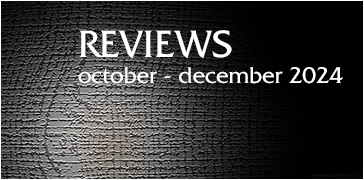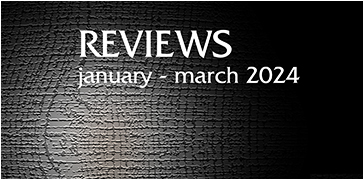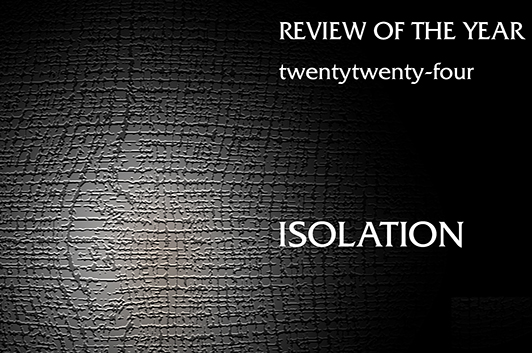

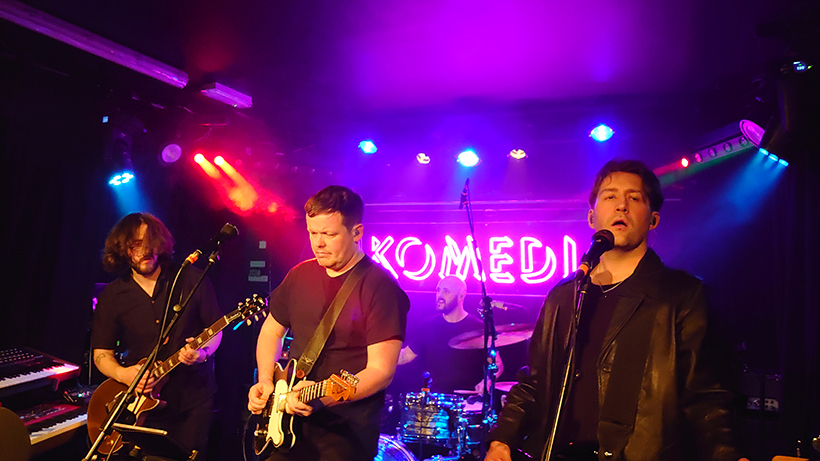
When you look at this band it is easy to forget just how ephemeral the world of indie music is; bands generally rise and fall with dizzying rapidity, yet Ist Ist appear to have carved out an enduring niche. They feed and they grow. Celebrating their 10th anniversary in 2025, the Manchester-based quartet are a testament to resilience, creativity and an unyielding commitment to artistic integrity. Their journey, rooted in self-reliance and marked by steady evolution, is a compelling narrative for those who value music as both craft and expression.
Theirs is a story of singular vision. Emerging from Manchester, a city steeped in musical history, in their early days they faced inevitable comparisons to post-punk stalwarts Joy Division, yet, their trajectory has been firmly their own. "The Joy Division thing got so tiring years ago," Andy Keating reflects, his frustration tempered by an unwavering confidence in his band's own identity. For while Ist Ist's brooding vocals and bass-driven sound may evoke Manchester’s storied past, their work defies reductive categorisation. "We’ve never pushed the Manchester angle. We’re proud of where we come from, but we've always let the music speak for itself. Our sound belongs to us, not a legacy."
This quiet defiance has allowed the band to cultivate a voice that resonates beyond regional confines, and even international boundaries, proving that authenticity can outshine association. Their music is a dynamic synthesis of brooding lyricism and layered instrumentation, evoking emotion and intrigue in equal measure. "We've always wanted our songs to tell their own stories," he adds, "without needing a footnote."
Ist Ist’s steadfast independence is not just a point of pride but a cornerstone of their ethos. They've built their career brick by brick, running their own label and meticulously overseeing every aspect of their music's creation and distribution. "We’ve never had external funding," Andy insists. "No labels, no benefactors. Everything we’ve achieved has been through our own efforts.”
As they become known to an ever-widening fan-base, Andy grins at the suggestion that Ist Ist are a new young band just lifting their heads over the horizon, "I like it when people say we’re a great new young band. We’re not that. We’ve been going nearly ten years and one of us is nearly forty."
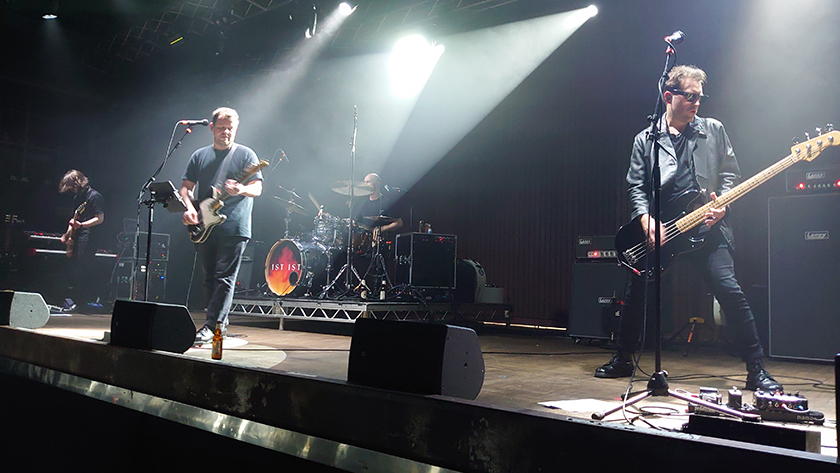
Their latest album, Light a Bigger Fire, epitomises the band’s artistic evolution. It’s a collection that juxtaposes their trademark intensity with a new-found sophistication. Haunting lyrics mix with buoyant melodies, crafting a paradoxical landscape that intrigues as much as it resonates. It's an impressive thing, our top album of the year because it marks progress, improvement and ambition. And it overflows with quality. Tellingly, it was approached in a different way from the first three.
"We had more time with this one. The more records you release and the more popular you get, the more breathing space you are allowed. You don’t have to be on a 12-month turnaround because you’ve got the kind of fans who will tolerate a whole year without you releasing anything, even a live album. You can go a full 12 months and people aren’t going to desert you. So, we took our time with this one. We started demoing not long after the Protagonists tour and we took a lot longer with this and the crafting of the songs. Then we went in with a new producer (Joseph Cross), and we sort of re-demoed, where in the past we would do our demos and think we were ready for the studio. This time we played our demo versions of the songs, went in with Joe, broke them apart, built them up again and got them to a studio-ready point. It was genuine pre-production. In our mind our demoing was pre-production because that was the way that we operated, whereas this time it was very much pre-production in a more modern, true sense of the word.
"We spent a lot more time post-recording as well. We had the release date set, but we knew we had time. Because we have all gone full time with the band we wanted to start off the way we were going to go on, and if we now had the time to do things properly, well, we were going to do them fucking properly. On Protagonists there’s a song called 'Mary in the Black and White Room'. I love that song but I've always got in the back of my head that there's maybe 20% more that could have come out of it. So, the the attitude this time was, don't knowingly leave anything in the studio. The time before that we were still all in work and we booked a few long weekends. It was done in 12 days and we were going in Friday, Saturday and Sunday. Each time we were going in, we had an agenda for those days, everything we needed to get down. And then when it was done we left it. This time we were like, no, if we’re not quite happy with a certain thing, we would mine into it and I’m talking like minute fucking detail on stuff, even down to your snare reverbs and the length of the tones. We were just so much more thorough with it. I think it comes across.
"There’s a lot more layers to it. One of the really good things to say about Architecture was that there were layers, but the sparsity of it was its selling point. Light A Bigger Fire is one of those where you'll still hear something new after ten listens, which all the good albums kind of do. Architecture revealed itself pretty early, but it was just enjoyable. Do I look back on the first three albums and think that they could have been better? Yeah, yeah. And if you asked me in a year, I'd probably say the same about Bigger Fire, but maybe you’re just never happy with what you do. Not fully. But I think that's why we’ve always tried to push ourselves a bit more. We’re not restless, but we're at least critical. In a good way. You're always striving for something else. One thing that Adam has consistently said is that he always comes away thinking maybe he could have been a bit better lyrically or put in better vocal performances, but right now he is saying that he couldn't have done any better. He's working outside of the box a bit more. I think working with a producer who's very much bringing their own ideas to it allowed him to work outside his usual parameters.
"It was the first time someone had really pushed us as well. Joe loved it and respected it, but not to the point where he just bowed down to it. In the past, with all due respect to Wally who did our first three albums, we were the biggest band he'd ever worked with or the best band he'd ever worked with. So in terms of credentials, it was hard for him to turn around and say to us, lads, that ain't working or you’re not doing that. He kind of brought his own flavours in. He would say why don’t we try the steel snare instead of a wood one? Or why don’t we try a bit more drive on that guitar? But that’s just little flavours here and there. It’s not wholesale changes. Whereas with Joe, the first track we worked on with him was 'Lost My Shadow' and the first thing he said was, "Why is that intro so long?" If you listen to the demos, the intro is twice as long. Me and Adam went, "You know, cos it's good, it’s a hook." He just said, "I’ll cut that in half." He respected it, but he was going no, no, no no, no. He had all these notes because he'd had the demos for months and he changed things. He completely restructured the chorus. He was saying, "You’ve got to earn that chorus. You’ve got to earn the pay-off."
"The way that it usually worked was that we’d be in at about ten and we’d leave about six. He would carry on working till about eight or nine, and then he’d send a bounce over. And the first bounce took most of the guitars right out; it was very electronic and cool, but we just said that wasn’t what we wanted. By that point of the process, we had started to push back a bit but there was no needle. There was no needle with it at all. What he was trying to do a lot of the time was to show us what we could do with it. He went to the extreme to show you how far it could go and then you might say, "Actually I like that, but that's a little extreme. So let's take some of that but put the guitars back." We kind of met in the middle somewhere. On 'Ghost', he didn’t originally like the drums straight at the end. He wanted more of a rolling sort of thing. He thought it sounded a bit obvious. And we were like, "No, we want it to be really claustrophobic," so that was one of them that we pushed back on and did our way.
"In the past we didn't really have the time to be that thorough because we were all fucking back at work on the Monday morning. And then you've got to leave it alone for a week before returning. It always took us about a day to get back into it, listening to what we had recorded before we carried on. We'd spend half a day doing that. These recordings were made just after those shows at The Yard (Ist Ist played all three of their albums in two shows there in November 2023). His studio was at the back in a courtyard full of shipping containers. They had been converted into studios, so we felt like we’d been at The Yard for months because we did those shows there. We were in his studio on a Monday late in November and we were there five or six days a week for ten weeks. We did the bass and drums at a different recording studio, but then we were back in there and it was like we just lived there."

One of the joys about the album is how unified it feels, everything fits neatly together, though every track is different. It is important to the band that an album stands as a complete work of art rather than just be a collection of random songs cobbled together at any given time. "When we make an album, everything has to tie in, but everything ties in to what you are at that point. Every album is a point in time really. This album is slightly less representative because of how long we spent on it. Whereas Architecture was was written over maybe three months, it was recorded in a week so that was a snapshot of a pretty narrow window of time. Art of Lying was a six-month thing, really. Protagonists? Maybe a bit less so. It sounds incredibly corporate, but with this one we consciously levelled up in terms of production, in terms of songwriting, in terms of how long we could go out on tour, and the quality of the touring we are doing. But you do have to focus on a sound and idea. I think you want commonality within a record because otherwise it can start to look a bit piecemeal. We try and stay in the current of what we are at the time. But in terms of the artwork and everything else, I am very much an advocate of it all has to make sense. The records, the sleeves, the videos, the colour palettes, the merchandise – it all has to be in the same kind of sphere."
"We do have songs that we reject because they don’t fit in with the mood of an album. We tend not to go too far with them these days whereas in the past we’d maybe go down the rabbit hole with something and then then decide, hang on, this doesn’t work. And it might have wasted days. Now we won’t exhaust a song before deciding whether it is right. A lot of ideas come from the songwriting process and this is a bit different now, in the sort of demo that Adam will send. He’ll put drum beats on a song or chord progressions, but it's mainly so he can get his lyrics down and put the melodies over it. It then comes into the room with us, and we put it through the wringer. The words come first, or sometimes even the vocal melodies, or the cadence of it. Once the music builds up around it, he might say that he likes the melody, but not the words. So the words get tweaked."
It is clear from listening to the album how far Ist Ist have improved as musicians, but Andy insists this is not something they specifically set out to achieve, it being an organic progression. "I think it just happened. I probably play bass more than ever, because I'm touring and rehearsing so much, but I don't physically practice as much as I used to. Joel's always practising. Joel’s always down at the rehearsal room, just drumming and learning bits and pieces, patterns or whatever. I don't think anyone ever saw it as I’m going to use the band to become a better musician, but we became better for the band. I don't know how I'd hold up as a bass player for another band because I've not played with another band for ten years. So my playing and my style is completely suited to Ist Ist. I would say my playing is better than it ever has been. Definitely. I think it's a bit more creative. I think it's a bit more prominent and a bit more individual. Joe, the producer, really pushed me on some parts because he’s a bass player himself. He's a solid enough player, but I'm probably a bit more creative in the structures and the phrasing of it. But my style is very much his and he really pushed me on certain parts. I liked his language. He'd say, "You need to pop that out a bit more" and I knew what he meant. It maybe by either stepping on the overdrives a bit more, or by enforcing some of the octaves a bit more. I enjoyed being pushed like that.
"Sometimes the beauty is what you don't play on certain parts or songs because it emphasises it more when you do. In something like 'Lost My Shadow' I could play some much more fancy shit on that, but that’s the sort of song that just needs the bass to hold it down; it needs a bass and drums to lock in. Whereas, on something like 'What I Know', I'll go to town. The isolated bass tracks I've listened back to have had me going, "Fucking hell, that’s got that right." And I don’t know how I did it. Because I've got so into it in the studio the first bass we did had to be the final one; I hit some sort of octave phrasing and I couldn’t do it again. I had to wait until we could get the stems and realised I'd have to relearn how to play it.
"When Matt’s playing his piano it really comes to the fore. Matt’s always been a great player, but I think he's pushed himself to really add some nice flourishes, especially on the piano parts and the keyboard parts. When he joined the band half of the set and half of the songs were already written, so what he added was purely decorative. I think he did it well. It was tasteful, but it was essentially decorative because everything was already in place and the way we were writing songs as a three piece didn't really leave much space for for manoeuvre. This time we're a fucking fully sealed unit. We all know our role in the band and we all know what we’re good at."

“On 16th January it's our tenth anniversary and we are playing at Night & Day in Manchester. It's the venue where we played our first gig and it’s going to be exactly ten years to the day. And then we're doing another one at Gorilla the night after that. So we're instantly into 2025 and I imagine by that point, we'll know what our quarter one and two tour schedule looks like. Where the challenge is going to come is that we need to earn enough by touring to stay full time, which I think we will be fine with. We won't write another album in that time, so we've never been in a better place. We all really get on. We've never fallen out. Ever. If you have a problem on the road, it's a common problem. It’s not like someone's got an issue and everyone else has to fucking deal with it. Yesterday, before we went to Bristol, we got a flat tyre and I was like, "Oh my fucking god, what if we can’t get there?" So it's like shared problems on tour, which makes you stronger. We genuinely couldn't be in a better place because no one's coming to rehearsal after a shit day at work, and no one’s trying to cram in a holiday with their other half or whatever. You know, Adam’s got a young daughter, and he's not trying to beg, borrow and steal time to spend with family before fucking off on tour for two months. So the balance is so much nicer. But there is going to come a point where we're going to have to write another album."
